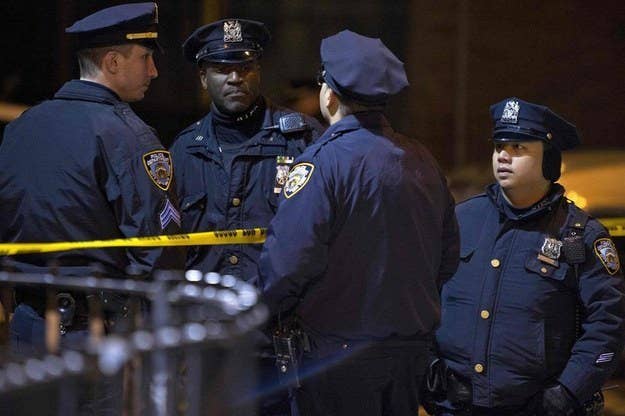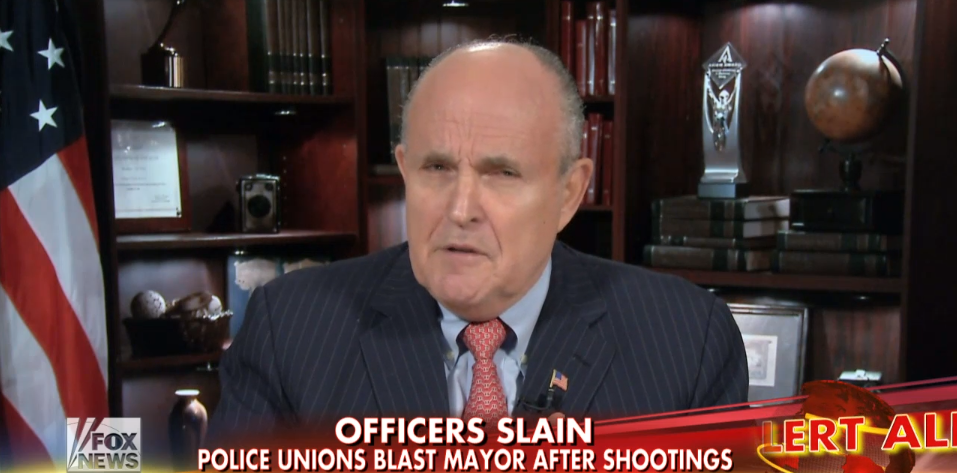
As investigators scrambled to understand how two NYPD officers were murdered Saturday, a group of public figures began pointing fingers at a surprising culprit: Mayor Bill de Blasio.
The blame came from past and current political and police leaders, most of whom suggested that de Blasio's policies were in some way responsible for the circumstances that led to the shootings.
One of the first to speak out was former New York Police Department Commissioner Bernard Kerik, who both in an interview and on Twitter said de Blasio and the Rev. Al Sharpton had blood on their hands:
De Blasio, Sharpton 'Have Blood on Their Hands' http://t.co/SRxycB2tuy
Soon, others joined in. Former New York Governor George Pataki and the Sergeants Benevolent Association also tweeted that de Blasio was to blame.
Sickened by these barbaric acts, which sadly are a predictable outcome of divisive anti-cop rhetoric of #ericholder & #mayordeblasio. #NYPD
The blood of 2 executed police officers is on the hands of Mayor de Blasio. May God bless their families and may they rest in peace.
But the most searing criticism came from Patrick Lynch, the president of the Patrolmen's Benevolent Association, the NYPD rank-and-file union.
During a video recorded news conference, Lynch slammed de Blasio, saying that "blood on the hands starts on the steps of City Hall in the office of the mayor."
The comments underscored the contentious relationship between de Blasio and police.
De Blasio's relationship with the NYPD has publicly deteriorated in recent weeks as protests over Eric Garner's death — caused by a chokehold applied by a police officer — poured into the streets. Most notably, a letter circulated among police that gave officers a chance to ask that "Mayor Bill de Blasio and City Council Speaker Melissa Mark-Viverito refrain from attending my funeral services in the event that I am killed in the line of duty."
The letter cited de Blasio's "consistent refusal to show police officers the support and respect they deserve."
Lynch also criticized de Blasio for comments he made during a news conference about the Eric Garner grand jury decision.
The animosity between de Blasio and police officials trickled down to the rank-and-file.
At a news conference Saturday, rows of officers turned their backs to de Blasio as he arrived at the hospital, an apparent display of opposition.
The criticism of de Blasio highlights the nationwide tension over the role of police in the U.S., which doesn't appear to be going away anytime soon.
Other law enforcement officials hinted at that tension Saturday. During the news conference with de Blasio, NYPD Commissioner William Bratton referenced an "anti-police" climate. And Roy Richter, of the Captains Endowment Association — the union representing NYPD captains — warned in an interview with DNAinfo of "a war on that thin blue line which is the protection between a society that is civilized and one that has no rules."
The comments and criticism of de Blasio all come as protests over recent police killings — mostly of black men — continue across the country.
The conversation continued to rage early Sunday morning. Several hashtags, including #NYPDLivesMatter, began trending on Twitter, with many users debating whether or not leaders like de Blasio actually were to blame for the shootings.
Following the shooting, former Sen.r Scott Brown criticized the "divisive rhetoric from the [White House}."
In a Fox News interview Sunday morning, former New York City Mayor Rudy Giuliani said now is not the time to say there is "blood on the hands" of Bill de Blasio, but it is appropriate to discuss his policies.

"It is the right time to talk about [de Blasio's] policies," Giuliani said. "His policies of allowing protests to get out of control, and of his not emphasizing enough the importance of fatherhood, the importance of education, the importance of an alternative to a public education system that is failing the black children."


